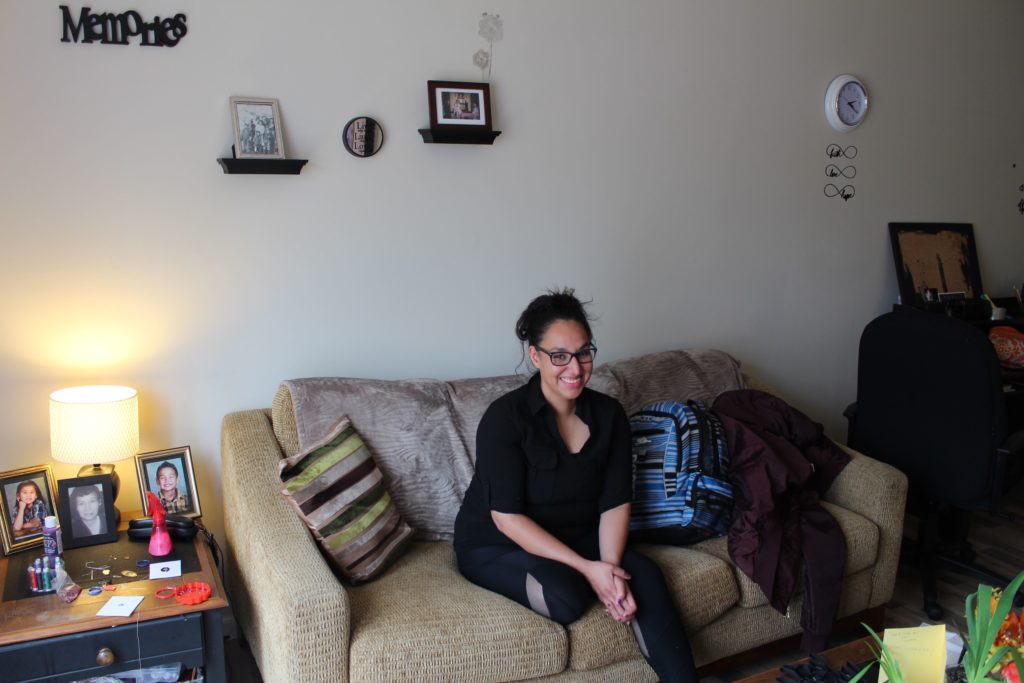
Follow Up Friday: April’s Journey Part 2
Last week, we shared the beginning of April’s story, and her journey with the ICMT team. Since becoming housed in an apartment of her own, April has begun an incredible journey of soul searching, self love, and growth. This is part two of April’s story – but not the ending. It’s only just begun.
“You’re Not Good Enough.”
April remembers hearing that in the back of her head, there was always that nagging voice, and feelings of unworthiness.
She is good enough. In high school, six weeks out from graduation, April’s teachers told her that she couldn’t decorate the graduation hall, because she wouldn’t be graduating. April told her teachers to make her a plan to get her grades up in order to graduate with her class, and she would stick to it. She did, and graduated alongside her classmates. But that feeling of unworthiness returned when she realized that her diploma was a blank piece of paper – her teachers had not had a diploma printed for her as they didn’t believe she would walk the stage. “They didn’t think I’d make it,” she explains. Her inner voices were debating against her within her mind, telling her that “you shouldn’t be able to progress this fast.”
That’s a fight she’s continued to battle to this day.
Recently, April was accepted into Concordia University. Once again, her voices stated “You shouldn’t be able to progress this fast,” and she thought “why not?” When recalling her admissions process, she laughed and stated that she went to register, and the admissions coordinator advised that she needed to apply first. “I had it all wrong,” she laughed. After making several trips back and forth to the University – her application process was complete, and she was accepted in May.
April says that her mindset is different – she wakes up thinking “what can I overcome today? What can I overcome?”
Supporting youth has always been April’s passion, and she wants to continue this work into a counselling role through her education. Support has always been her strength; at twelve, she was responsible for taking care of her nephew, ensuring that he was clothed and fed. “He was a gang baby”, April explains, the product of two rival gang members, and the family didn’t want any part of a gang association. From a young age, friends of his parents were “throwing gang colors at him.” April didn’t want her other nephews, now 16, 18 and 21, to be a part of that culture. “I don’t blame anyone,” she reflects “we did the best we could regardless of the circumstance.” It took the entire family to raise her nephew, and in turn, she wants to be there for them. Her nephews were a huge contributing factor to her getting clean.
“I wanted to be sure I could be there for them. It was time for me to wake up and face reality. I want to break the cycle of intergenerational trauma.”
Thoughtfully, April recalls a recent outing with her nephews to Rupertsland Institute, where all three of them worked on resumes, and then dropped them off at Home Depot. Shortly after, the 18 year old nephew registered in the YouCan programs. April says that she told him “If you want something, go out and get it. Being there for them is so important.” The love that she has for her family is evident. She mentions her learnings from counselling and falling into that cycle of trauma, and how she is helping her family move out of that. “We are self-deprecating. Even at home, the language we use to describe our culture, our living situations. We put ourselves in that trauma mindset.” April is working with her family to celebrate their heritage and their culture, “We’d use bad language [before], words like Indian, savage…now we don’t use those words.”
Reflecting, April shares that when someone fall in their family, they all fall. When they rise, they rise with them.
Her journey is ongoing, but for now, April says, “I’ve gotten this far, I’ve been accepted. I’ve learned so much [about myself], what my favorite flower is, my music. I’ve realized I love to walk. I’ve learned ‘don’t ever be ashamed of who you are.’ There are many indigenous people on the street, in jail, in hospital. Why is that? It’s because of intergenerational trauma. Little programs help [make a difference], even if it’s just saying hi.” April’s parents were part of the sixties scoop, and she says that their struggles are highlighted when she shares her learnings. “My mom, she feels shame when my sisters share their stories about growing up, and the work they’re doing on themselves. It triggers trauma for her.” Focusing on her personal growth, sharing her story, and going to school to help others head down the same path to understanding and self-love, is the next phase in her journey, and something that she hopes will inspire others in her family to begin to heal.
“Just keep going, don’t let anything hold you back,” is the message she’d like to share with others.
She’s not rushing back to work, and realizes that being accepted into school is a remarkable achievement within itself. “When I’m ready, I’ll go back to work. For now, I’m just focusing on myself.”
Sitting in her serene apartment, surrounded by greenery, the calming sound of rain through the balcony door, and the smell of sage lingering in the air, there is no doubt that April is bound for big things; her story is just beginning.

